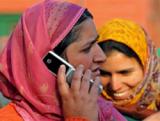
New Delhi, October 12: Nearly 10,000 phones are being lawfully tapped in various states, according to official data available today.
Over 4,500 phones were intercepted during the month of August in addition to more than 5,000 phones which were already being tapped. The interception is ordered by various intelligence agencies, police forces and Army.
Besides phones, nearly 1,200 email addresses were also being intercepted under the Indian Telegraph Act, according to information given to a high-level committee which reviews such orders issued by the Union Home Secretary.
The Committee comprising Cabinet Secretary Ajit Seth, Telecom secretary R Chandrasekhar and Law Secretary B A Agarwal, which met here recently, confirmed the orders passed by the Home Secretary and also cleared a fresh request for monitoring 559 emails of various individuals, it said.
Intelligence Bureau(IB) topped the chart monitoring nearly 6,000 phones out of which over 2,100 requests were made in August alone and was followed by Delhi Police which made 738 requests in the month besides keeping under surveillance 19 others, the sources said.
Army's Signal Intelligence (SI) is tapping over 1,100 phones out of which 577 requests were made in August while 527 are already being intercepted by it, the sources said.
Directorate of Revenue Intelligence(DRI), which had over 160 phones already under its scanner, has made a fresh request for intercepting nearly 350 phones during the month, they said.
The Committee, however, rejected 17 requests made by intelligence agencies and demanded more clarifications on the issue of public emergency or public safety in respect of orders passed for fresh interception and continuing it, the sources said.





Comments
Add new comment